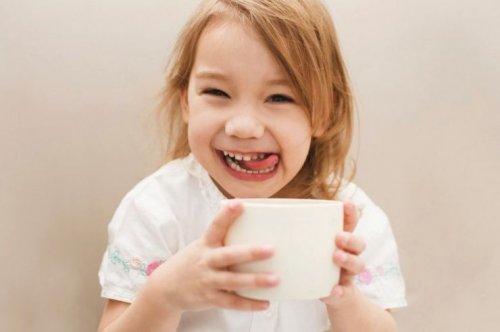Coffee and Children: What Is the Best Advice?

Many people believe that coffee and children are not a good combination. Caffeine usually activates the central nervous system, and this has a harmful effect in little ones.
Coffee and children: is it wise to avoid this drink?
Many parents would never give coffee to their children, as they understand that it’s bad for their health. While in reduced doses it can give people more energy, too much coffee can cause a lot of damage, especially to children.
Something else we need to take into account is that each child’s body reacts in a different way to this stimulant.

Negative effects of coffee in children
- Restlessness, nervousness and anxiety.
- Upset stomach.
- Headaches.
- Difficulty concentrating.
- Difficulty sleeping.
- Accelerated heart rate.
- Increase in blood pressure.
Some children may experience two or three of these symptoms, while others experience all of them, to a greater or lesser degree.
Sometimes these signs aren’t at all apparent. In these cases it’s more serious, as the child‘s body would be suffering damage without the parents realizing it.
Caffeinated beverages pose potential risks to children’s health
Sometimes children don’t consume coffee, but they do drink soda or drinks with caffeine, thus obtaining the same results. Children who consume a lot of soft drinks tend to suffer from obesity and often diabetes.
Some develop other problems such as difficulty sleeping or bad behavior, which highlights the importance of taking care of our little ones’ health.
Brittle bones
Although caffeine is harmful in children of all ages, this situation is worse when they are between 3 and 8 years old.
At this age their bones are in full development, and giving them coffee can prevent their body from absorbing the calcium they need. Calcium is also necessary for their teeth to be strong and healthy.
Possible cavities
Caffeine and sugar can cause cavities in children, and because of this, their teeth can be severely damaged. In the case of soft drinks, each glass has about 5 tablespoons of sugar, which is 150 calories.
Dehydration
Caffeine also makes the body lose large amounts of water. If a child were to drink coffee then they could quite easily become dehydrated. Experts can’t give an exact figure for how much caffeine is needed for the child to lose fluids, but what is known is that it happens and is harmful to the child.
Increase in body temperature
It’s common for children to consume plenty of soft drinks on hot days. This can lead them to get hooked on them, which in turn will affect their muscles and make them bad tempered and irritable.
On hot days we often just buy or reach for the first drink we find, but we should make sure they aren’t caffeinated.
“At early ages we need to remember that coffee and children aren’t a good combination”
Nervous disorders
Children are developing at a fast rate, and so, when they’re given caffeine, their nervous system is altered, and it can even cause heart problems.
Another reason why coffee and children aren’t a good combination, is that caffeine is capable of stunting their growth. Scientists have known for a long time that this substance was harmful to the body, but they didn’t know for sure just how serious it was.
Thanks to modern day advances it has been discovered that the damage can be very serious and even irreversible.

Maintain good health
Although many drinks contain caffeine these days, it is possible to avoid them. The most important thing of all is that a child should be happy and healthy.
While a single cup of coffee doesn’t have serious complications, it’s best to avoid anything that may be harmful in the long run. We must ensure that any soft drinks our children consume are low in sugar.
Parents are the ones responsible for their children’s health. Although children are always very attracted to soft drinks, parents need to be firm and offer low sugar alternatives. Natural juices or homemade smoothies are always excellent options.
“Taking care of their child’s health should always be a priority for parents.”
Because children’s nervous systems are weaker than adults’, many nutritionists recommend that, for this reason alone, coffee should be avoided at an early age. If this advice is not heeded then it could have consequences for them throughout the rest of their lives.
Many people believe that coffee and children are not a good combination. Caffeine usually activates the central nervous system, and this has a harmful effect in little ones.
Coffee and children: is it wise to avoid this drink?
Many parents would never give coffee to their children, as they understand that it’s bad for their health. While in reduced doses it can give people more energy, too much coffee can cause a lot of damage, especially to children.
Something else we need to take into account is that each child’s body reacts in a different way to this stimulant.

Negative effects of coffee in children
- Restlessness, nervousness and anxiety.
- Upset stomach.
- Headaches.
- Difficulty concentrating.
- Difficulty sleeping.
- Accelerated heart rate.
- Increase in blood pressure.
Some children may experience two or three of these symptoms, while others experience all of them, to a greater or lesser degree.
Sometimes these signs aren’t at all apparent. In these cases it’s more serious, as the child‘s body would be suffering damage without the parents realizing it.
Caffeinated beverages pose potential risks to children’s health
Sometimes children don’t consume coffee, but they do drink soda or drinks with caffeine, thus obtaining the same results. Children who consume a lot of soft drinks tend to suffer from obesity and often diabetes.
Some develop other problems such as difficulty sleeping or bad behavior, which highlights the importance of taking care of our little ones’ health.
Brittle bones
Although caffeine is harmful in children of all ages, this situation is worse when they are between 3 and 8 years old.
At this age their bones are in full development, and giving them coffee can prevent their body from absorbing the calcium they need. Calcium is also necessary for their teeth to be strong and healthy.
Possible cavities
Caffeine and sugar can cause cavities in children, and because of this, their teeth can be severely damaged. In the case of soft drinks, each glass has about 5 tablespoons of sugar, which is 150 calories.
Dehydration
Caffeine also makes the body lose large amounts of water. If a child were to drink coffee then they could quite easily become dehydrated. Experts can’t give an exact figure for how much caffeine is needed for the child to lose fluids, but what is known is that it happens and is harmful to the child.
Increase in body temperature
It’s common for children to consume plenty of soft drinks on hot days. This can lead them to get hooked on them, which in turn will affect their muscles and make them bad tempered and irritable.
On hot days we often just buy or reach for the first drink we find, but we should make sure they aren’t caffeinated.
“At early ages we need to remember that coffee and children aren’t a good combination”
Nervous disorders
Children are developing at a fast rate, and so, when they’re given caffeine, their nervous system is altered, and it can even cause heart problems.
Another reason why coffee and children aren’t a good combination, is that caffeine is capable of stunting their growth. Scientists have known for a long time that this substance was harmful to the body, but they didn’t know for sure just how serious it was.
Thanks to modern day advances it has been discovered that the damage can be very serious and even irreversible.

Maintain good health
Although many drinks contain caffeine these days, it is possible to avoid them. The most important thing of all is that a child should be happy and healthy.
While a single cup of coffee doesn’t have serious complications, it’s best to avoid anything that may be harmful in the long run. We must ensure that any soft drinks our children consume are low in sugar.
Parents are the ones responsible for their children’s health. Although children are always very attracted to soft drinks, parents need to be firm and offer low sugar alternatives. Natural juices or homemade smoothies are always excellent options.
“Taking care of their child’s health should always be a priority for parents.”
Because children’s nervous systems are weaker than adults’, many nutritionists recommend that, for this reason alone, coffee should be avoided at an early age. If this advice is not heeded then it could have consequences for them throughout the rest of their lives.
All cited sources were thoroughly reviewed by our team to ensure their quality, reliability, currency, and validity. The bibliography of this article was considered reliable and of academic or scientific accuracy.
- Yoshida, Y., & Simoes, E. J. (2018). Sugar-Sweetened Beverage, Obesity, and Type 2 Diabetes in Children and Adolescents: Policies, Taxation, and Programs. Current diabetes reports, 18(6), 31. https://doi.org/10.1007/s11892-018-1004-6
- Watson, E. J., Banks, S., Coates, A. M., & Kohler, M. J. (2017). The Relationship Between Caffeine, Sleep, and Behavior in Children. Journal of clinical sleep medicine : JCSM : official publication of the American Academy of Sleep Medicine, 13(4), 533–543. https://doi.org/10.5664/jcsm.6536
- Wikoff, D., Welsh, B. T., Henderson, R., Brorby, G. P., Britt, J., Myers, E., Goldberger, J., Lieberman, H. R., O’Brien, C., Peck, J., Tenenbein, M., Weaver, C., Harvey, S., Urban, J., & Doepker, C. (2017). Systematic review of the potential adverse effects of caffeine consumption in healthy adults, pregnant women, adolescents, and children. Food and chemical toxicology : an international journal published for the British Industrial Biological Research Association, 109(Pt 1), 585–648. https://doi.org/10.1016/j.fct.2017.04.002
This text is provided for informational purposes only and does not replace consultation with a professional. If in doubt, consult your specialist.








